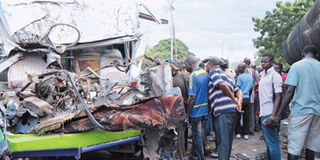Tamwa joins road safety drive

Data shows that loss from accidents accounts for 3.4 per cent of the gross domestic product annually in Tanzania. PHOTO|FILE
What you need to know:
- Under the programme, Tamwa is set to work with partners such as the media, vehicle owners, bodaboda associations and other stakeholders, according to the project coordinator, Ms Gladness Munuo. “Our aim is to ensure that roads do not become the cause for financial and social loss to individuals and the nation at large.”
- Tamwa realises that a lot of women and children bear the brunt of road accidents.
Dar es Salaam. The Tanzania Media Women’s Association (Tamwa) has embarked on a project to create awareness to the public on the need of making road transport safe.
Under the programme, Tamwa is set to work with partners such as the media, vehicle owners, bodaboda associations and other stakeholders, according to the project coordinator, Ms Gladness Munuo. “Our aim is to ensure that roads do not become the cause for financial and social loss to individuals and the nation at large.”
Tamwa realises that a lot of women and children bear the brunt of road accidents.
Experts note that by carrying out the project, Tamwa will not save women and children alone, but also men because occasionally men, women and children travel together by buses. Therefore, if a woman is made aware of what steps to take when a driver violates rules, she would not save herself alone, but all the passengers.
According to Tamwa executive director Edda Sanga, though data on direct victims of road safety shows that men are the most affected, you will realise that it is women and children who are the hardest hit.
“What many people don’t know is that many women and children depend on men. But such die, are injured or are immobilised in road accidents. This means that these women are left with responsibility of fending for the families because the breadwinners have been killed in accidents,” she said.
Dr Godfrey Sansa from the Tanzania Centre for Disaster and Risk Mitigation noted that there was a need for a comprehensive follow-up of victims of accidents to have detailed information on what loss the nation incurs from road accidents.
He noted it was unfortunate that when accidents occur, many people, including the media, focus on only the number of those who have been affected.
“But no one is interested in who are these people. Worse enough, the story ends when these victims are sent to hospital. After that no one bothers to make a follow-up. This denies us of concrete data on the actual impact of accidents,” he said.
He noted that hospitals which deal with accident victims should also keep detailed profiles of the victims so as to enable those who are interested in making follow-up on them to do so.
He said such a follow-up would facilitate data collection and information on the impact of accidents to individuals and from that it would be easy to compute the actual loss caused to the nation as a result of accidents.
Besides, Tamwa efforts would help the country reduce the loss from accidents.
Data shows that loss from accidents accounts for 3.4 per cent of the gross domestic product annually. This is a huge amount of money and its saving would provide more financial resources for the government to improve social services.
Stakeholders who attended the Tamwa launch of the road safety project agreed that it is possible to reduce the number of road accidents and save the country’s colossal sums of money.
“Most accidents, if not all, occur as a result of decisions made by road users. Therefore, we can control accidents if we check on how we approach road safety issues,” said Mr Jones John from the Bloomberg Initiative for Global Road safety.
He noted that though there are several factors which cause road accidents, to a great extent, behaviours of people who use the roads — drivers, bodaboda operators, cart pushers, pedestrians and others — are key to what happen on roads.
Loss of human life
Chief traffic police commander Mohammed Mpinga said in addition to causing monetary loss, accidents were a major cause of deaths and injuries to many Tanzanians. Launching the project, he noted for instance in the first half of this year, 5,152 accidents claimed lives of 1,580 people across the country.
He said 4,659 people were injured in the accidents.
More than 430 died and 1,147 injured in 1,356 motorcycle accidents.
“It is my hope that this project will help us to reduce the number of accidents and subsequently number of people who die or who are injured in the mishaps.”
He called on stakeholders to push for the amendment of traffic laws and regulations to have stiffer penalties to road laws offenders.
According to him, some drivers are not afraid of breaking traffic rules simply because they know that such an offence will attract only a small fine.
“Had the sentence for those offenders been imprisonment and not a fine, I believe many people would be avoiding to break traffic laws,” he said.



